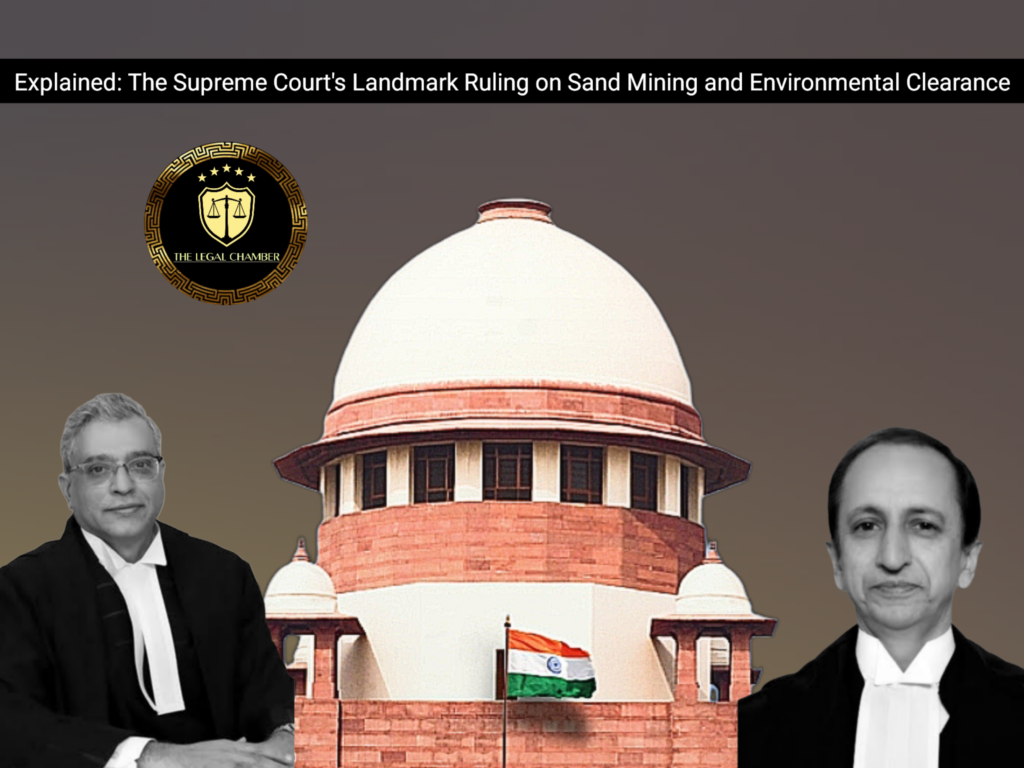
This Supreme Court judgement reaffirms that a valid District Survey Report (DSR), prepared under the EIA Notification, 2016, is mandatory for granting environmental clearance for sand mining. The Supreme Court held that a DSR is legally untenable without a scientific replenishment study, as it forms the foundational basis for determining sustainable extraction limits and ensuring ecological balance.
Facts Of The Case:
The case originated from the grant of an Environmental Clearance (EC) for sand mining in three blocks on the Shaliganga Nallah in Jammu & Kashmir. The project proponent, contracted by the National Highway Authority of India for a Srinagar ring road, applied for the EC. Initially, the J&K Expert Appraisal Committee (EAC) rejected the proposal in January 2022, citing that the area was over-exploited and that the existing District Survey Report (DSR) was non-compliant with guidelines as it lacked replenishment data. However, after the proponent obtained a ‘Fit for Mining Certificate’ from the Geology and Mining Department in February 2022, the EAC reversed its stance in March 2022 and recommended the EC. This recommendation was made despite the EAC explicitly noting that the DSR still required revision to include the crucial replenishment study. The J&K Environment Impact Assessment Authority (EIAA) then granted the EC in April 2022, but with a condition limiting mining depth to one meter due to the absence of replenishment data. An environmental activist challenged this EC before the National Green Tribunal (NGT), which set it aside for violating environmental norms. The appellants, including the UT of J&K and the project proponent, then appealed to the Supreme Court against the NGT’s order.
Procedural History:
The procedural history of this case began when the project proponent was granted an Environmental Clearance (EC) by the J&K Environment Impact Assessment Authority (EIAA) on April 19, 2022. Aggrieved by this decision, Respondent No. 1, an environmental activist, filed an appeal before the National Green Tribunal (NGT), challenging the legality of the EC. The NGT, after examining the case, allowed the appeal and set aside the EC, finding it to be in violation of environmental norms, particularly due to the reliance on a non-compliant District Survey Report (DSR) that lacked a replenishment study. Subsequently, the appellants—the Union Territory of J&K, the NHAI, and the project proponent—filed civil appeals before the Supreme Court of India, challenging the NGT’s order. The Supreme Court, in its judgment dated August 22, 2025, heard these appeals and ultimately dismissed them, upholding the NGT’s decision to cancel the environmental clearance.The procedural history of this case began when the project proponent was granted an Environmental Clearance (EC) by the J&K Environment Impact Assessment Authority (EIAA) on April 19, 2022. Aggrieved by this decision, Respondent No. 1, an environmental activist, filed an appeal before the National Green Tribunal (NGT), challenging the legality of the EC. The NGT, after examining the case, allowed the appeal and set aside the EC, finding it to be in violation of environmental norms, particularly due to the reliance on a non-compliant District Survey Report (DSR) that lacked a replenishment study. Subsequently, the appellants—the Union Territory of J&K, the NHAI, and the project proponent—filed civil appeals before the Supreme Court of India, challenging the NGT’s order. The Supreme Court, in its judgment dated August 22, 2025, heard these appeals and ultimately dismissed them, upholding the NGT’s decision to cancel the environmental clearance.
READ ALSO:Supreme Court Backs Landowners: Slum Authority Can’t Acquire Land Without Notice
Court Observation:
The Supreme Court dismissed the appeals filed by the Union Territory of Jammu & Kashmir, the National Highway Authority of India, and the project proponent. It upheld the National Green Tribunal’s order which had set aside the environmental clearance (EC) dated April 19, 2022. The Court affirmed that the EC was granted illegally based on a legally invalid District Survey Report that lacked a mandatory replenishment study. Consequently, the environmental clearance stood cancelled. The Court also declined to interfere with the NGT’s direction for the J&K Pollution Control Board to take action against the project proponent for alleged violations of using heavy machinery. No costs were awarded.
Case Details:
Case Title: Union Territory of J & K & Anr. vs. Raja Muzaffar Bhat & Ors. Citation: 2025 INSC 1025 Civil Appeal No.: Civil Appeal No. 8055 of 2022 Date of Judgement: August 22, 2025 Judges/Justice Name: Justice Pamidighantam Sri Narasimha and Justice Atul S. Chandurkar
Download The Judgement Here